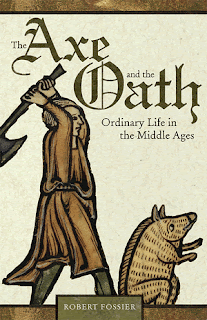Non-fiction. History books. Science for amateur readers. Politics. Social sciences. Essay collections. War reporting. Travel writing. All of them and more reviewed by the Bookworm. Pulp fiction not allowed.
Sunday 6 January 2013
Robert Fossier, The Axe and the Oath - Ordinary Life in the Middle Ages
My goodness, it's been a while since I read a history book quite as bad.
The Axe and the Oath is, or promises to be, an account of everyday life of ordinary people in the Middle Ages. Sounds fantastic, doesn't it? Wouldn't you like to know what an average Joe did or thought a thousand years ago? How did all those peasants in the background of Robin Hood stories live, etc. etc.? I surely would. The problem is, professor Fossier doesn't really answer the above questions. In fact, his book provides very little when it comes to solid data, being full of opinions and generalisations instead. There's even less information on ordinary people, despite multiple promises to the contrary. I do understand that due to lack of sources it is difficult to write anything definite on the subject, but still... What is the point of writing a book to tell you that there is actually nothing to tell?
Even if you want to see The Axe and the Oath as an introduction to medieval studies and follow up with other books, professor Fossier does not make it easy for you. No bibliography, no notes on sources, no suggested reading, nothing.
It gets worse. I found quite a few outrageous factual errors, like a claim that humans are the only mammal species with opposable thumbs (that is why homo sapiens are the most advanced animals out there). Oh really? What about chimpanzees? Gorillas? Orangutans? Shouldn't they have produced at least one great civilisation by now? There's more, but I'll let you to do the error-hunting yourself. Just remember to double check every piece of information you find in The Axe and the Oath.
When it comes to translation, it probably could not have been any worse. There's so much left of the original French that one wonders why the translator bothered at all.
Despite all the above, The Axe and the Oath actually reads quite smoothly. If you are able to ignore lack of any scientific solidity, you should be fairly satisfied.
If you treat your history seriously, avoid at all cost.
Subscribe to:
Post Comments (Atom)


No comments:
Post a Comment